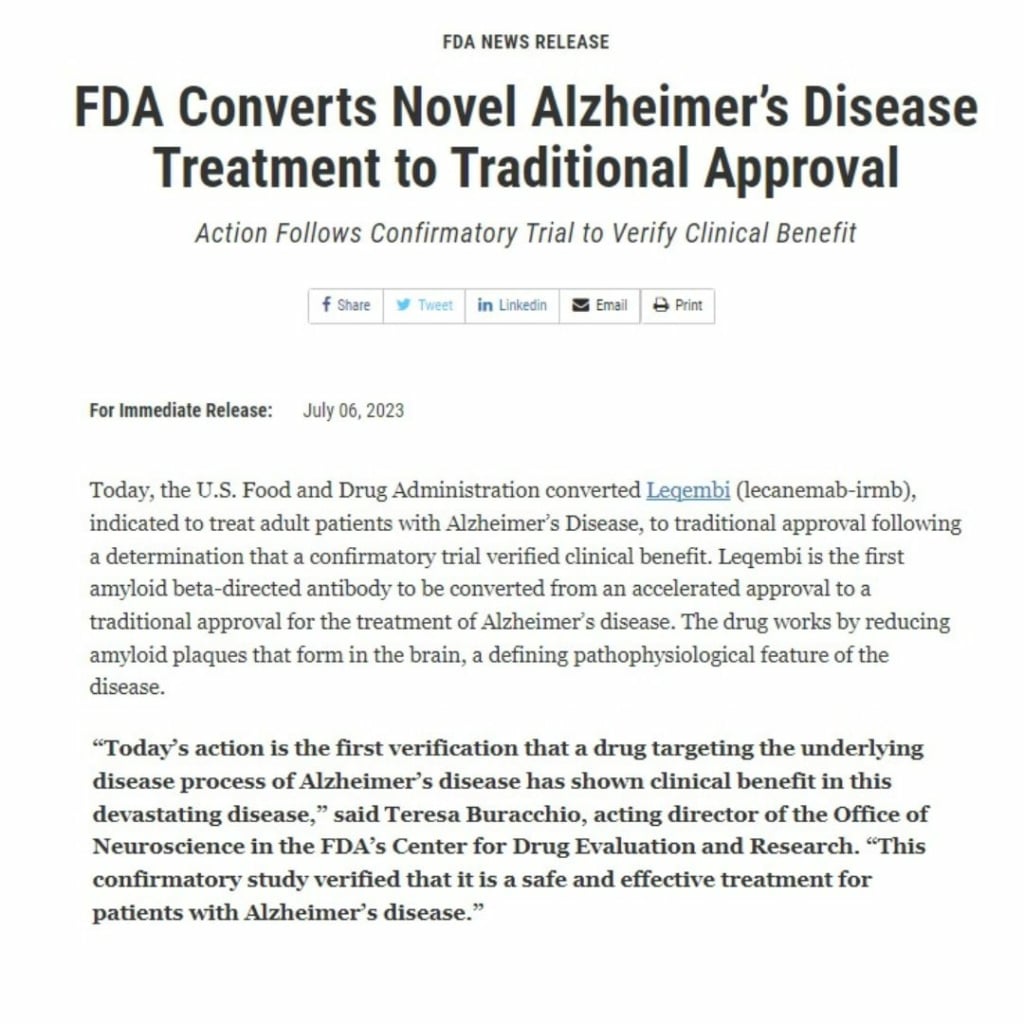Alliance Celebrates the First-Ever, FDA Traditional Approval of a Disease-Modifying Therapy for Early Alzheimer’s
Published July 6, 2023
Calls on CMS to Stop Rationing Care and Immediately Retire Its Excessively Restrictive “Coverage with Evidence Development” Medicare Policy
WASHINGTON, DC — The Alliance for Aging Research celebrates the first-ever, U.S. Food and Drug Administration (FDA) traditional approval of a disease-modifying therapy for Alzheimer’s disease. Traditional approval requires that clinical benefit be shown before approval can be granted.
Called Leqembi, the FDA traditionally approved monoclonal antibody therapy targets amyloid in people with early Alzheimer’s. Leqembi was initially granted Accelerated Approval by the FDA on January 6, 2023, after published data showed the therapy slowed progression of early Alzheimer’s by 27 percent over an 18-month trial.
However, more than a year ago the Centers for Medicare and Medicaid Services (CMS) announced it would refuse to cover the entire class of FDA-approved monoclonal antibody therapies for early Alzheimer’s, except for treatments provided through very narrowly constructed “coverage with evidence development” (CED) clinical studies. Medicare beneficiaries who can’t get into the CED studies — or who can’t access the study sites — are denied coverage. The agency reaffirmed that decision on June 1, 2023, when it announced that beneficiary enrollment in a registry would be one of several required conditions of coverage for Alzheimer’s drugs that receive traditional FDA approval.
It was an unprecedented move. Before CMS’s decision last year to limit access to new Alzheimer’s treatments under CED, the agency had never declined to cover a drug for its FDA-approved, medically accepted use. It was also the first time CMS denied coverage for an entire class of drugs based on clinical trial data for a single drug before any data on other drugs in the class were available.
“Medicare has covered FDA-approved medicines for every other condition, from arthritis to cancer to HIV,” said Sue Peschin, president and CEO of the Alliance for Aging Research. “Leqembi has met the FDA’s standard of review for traditional approval and its clinical benefit was validated by a unanimous vote of the FDA’s Advisory Committee of external experts. CMS must immediately stop rationing care to people living with early Alzheimer’s and provide access to Leqembi the same way they do for FDA-approved medications for all other diseases.”
According to the Alliance’s February 2023 report — Façade of Evidence: How Medicare’s Coverage with Evidence Development Paradigm Rations Care and Exacerbates Inequity — CMS’ application of CED effectively makes any FDA-approved Alzheimer’s drug inaccessible to most Medicare beneficiaries. According to the report, the CED registries and clinical studies CMS requires are deliberately designed for only a small fraction of beneficiaries. CED registries have taken more than a year to develop, and access is usually limited to major research universities located in wealthier, urban areas. CMS has shared little detail about how the CED registries and clinical studies for FDA-approved early Alzheimer’s therapies will function and when Medicare reimbursement for the therapy will be available.
Lawmakers have criticized CMS’s restrictive policy. For example, in a June 5 letter to agency administrator Chiquita Brooks-LaSure, Reps. Anna Eshoo, D-Calif., and Nanette Barragán, D-Calif., urged CMS not to “allow CMS’s demand for additional evidence generation be a barrier to patient care.”
Nearly nine in 10 voters favor requiring Medicare to cover the cost of FDA-approved drugs that can slow the progression of Alzheimer’s disease, according to a May poll conducted by Lake Research Partners and Public Opinion Strategies and commissioned by the Alliance, the LEAD Coalition, UsAgainstAlzheimer’s, and the Global Alzheimer’s Platform Foundation. A majority said that Congress or President Biden should step in and require Medicare to cover these medicines if CMS fails to do so.
“The traditional FDA approval of Leqembi is a victory for families facing Alzheimer’s. Meanwhile, officials at CMS are inserting themselves between doctors and families by requiring participation in a bureaucratic registry and additional clinical study to get the treatment. CMS is a payer and has neither the expertise nor the statutory authority to do this. Politicians should sprint to fix this access disparity before their opponents beat them to it.”
The Alliance for Aging Research is the leading nonprofit organization dedicated to accelerating the pace of scientific discoveries and their application to vastly improve the universal human experience of aging and health. The Alliance believes advances in research help people live longer, happier, more productive lives and reduce healthcare costs over the long term. For more than 30 years, the Alliance has guided efforts to substantially increase funding and focus for aging at the National Institutes of Health and Food and Drug Administration; built influential coalitions to guide groundbreaking regulatory improvements for age-related diseases; and created award-winning, high-impact educational materials to improve the health and well-being of older adults and their family caregivers. For more information, visit www.agingresearch.org.
— ## —
To schedule an interview with Sue Peschin, president and CEO of the Alliance for Aging Research, please contact Katie Riley, Vice President of Communications, Alliance for Aging Research, at [email protected] or (202) 688-1229, or IV Hendrix at [email protected] or (202) 980-4966 ext. 122.

